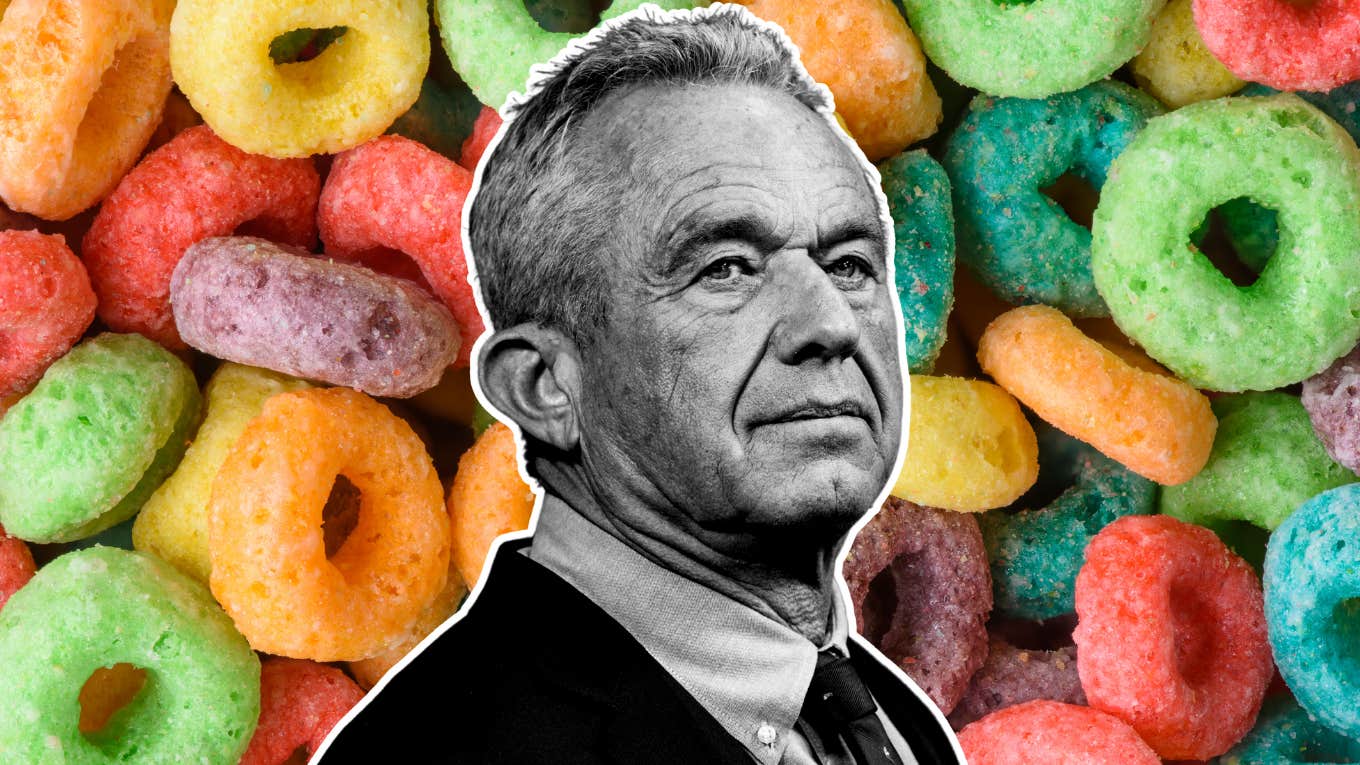Dietitian Explains Why RFK Jr's Ban On Artificial Food Dyes Is 'Performative' & 'Not Legally Binding'
Since when have corporations ever volunteered to be altruistic?
 chonesstock | lev radin | Shutterstock | Canva Pro
chonesstock | lev radin | Shutterstock | Canva Pro For those with concerns about everything from the American food supply to the safety of vaccines, the appointment of Robert F. Kennedy Jr. as head of the Department of Health and Human Services has been a godsend, and his recent "ban" on artificial food dyes has been met with celebration from his supporters. But there's just one catch: It carries no legal weight, and it has even sympathetic experts questioning the point of the announcement.
A dietitian says RFK Jr.'s food dye ban is nothing more than 'performative politics.'
Dr. Jessica Knurick is a registered dietitian with a Ph.D. in nutrition science and an educator on public policy and wellness. And her take on Kennedy Jr.'s latest move is simple and blunt: It is nothing more than smoke and mirrors.
In a post on Instagram, Dr. Knurick referenced the fact that the so-called MAHA movement, an acronym for "Make America Healthy Again," is celebrating Kennedy's ban on eight synthetic, petroleum-based food dyes like Red No. 40, Yellow No. 5, Blue No. 1, and Yellow No. 6.
Influencers in this space, like Vani Hari, the content creator and wellness author known as Food Babe, who has become a key mouthpiece for Kennedy Jr. and the MAHA movement, have been jubilant. In an Instagram post about the announcement, Hari cheered that "the FDA has heard our cries and change is here!" But there's just one problem: Kennedy Jr.'s "ban" is not a ban at all, but merely a request.
Most of Kennedy Jr.'s food dye ban relies on food manufacturers voluntarily policing themselves.
"These poisonous compounds offer no nutritional benefit and pose real, measurable dangers to our children's health and development," Kennedy said in his announcement of the ban on April 22. Joining him in the press conference, FDA commissioner Dr. Marty Makary claimed the dyes are linked to obesity, diabetes, ADHD, and cancer, along with other health conditions in children.
Though there is scientific evidence for these impacts, the subject is notoriously difficult to study, and there is little consensus among experts except where children's behavior is concerned. Still, even skeptics like Dr. Knurick agree that getting rid of the dyes is the best course of action. But Kennedy Jr.'s ban does no such thing, as his own statements confirmed.
Part of Kennedy's plan includes revoking FDA approval for two dyes, Citrus Red Number 2 and Orange B, which are rarely used anyway. The other six dyes, however, Blue Numbers 1 and 2, Green Number 3, Red Number 40, and Yellow Numbers 5 and 6, are subject to "the [food] industry [having] voluntarily agreed" to ban the dyes after reaching an "understanding" with him.
And Kennedy Jr.'s plan contains no details on how the ban will be enforced. When asked by a reporter from food policy news outlet Food Fix (at the 44:09 mark in the video above) what his "plan" was "if the food industry does not voluntarily agree" to stop using the dyes, Kennedy appeared to evade the question, simply restating that "the industry has voluntarily agreed and claiming that food companies had called him to express their enthusiasm towards working with him on this matter.
Pressed further by a New York Times reporter (at the 52:59 mark) on how they plan to enforce this "ban," Dr. Makary resorted to platitudes like "you win more bees with honey than fire," and "I believe in love," explaining that he and Kennedy feel this buddy-buddy approach to corporate America is far superior than actual legislation. "Why go down a complicated road with Congress when they want to do this?" Dr. Makary asked.
Food companies have publicly indicated they do not intend to remove the dyes.
To put it bluntly, the expectation that food companies would simply agree to change their entire processes and supply chain at enormous cost, solely because the government made an unenforceable request, is unlikely.
As Dr. Knurick put it, "So, the same crowd that routinely calls Big Food companies corrupt is now celebrating and putting all their faith in that same industry to just voluntarily comply?" The idea that these companies have suddenly seen the altruistic light is equally ridiculous.
And accordingly, trade organizations and lobbying groups for major food manufacturers have already publicly indicated that their commitment to complying with the ban is not exactly firm. Asked about the ban by NPR, Melissa Hockstad, president and CEO of the Consumer Brands Association, which represents companies like General Mills, Kellogg's, and Nestlé, responded that, "the ingredients used in America's food supply have been rigorously studied … and have been demonstrated to be safe." There was no mention of complying.
Likewise, the National Confectioners Association told NPR, "We follow and will continue to follow regulatory guidance from the authorities in this space." Keyword there: "regulatory," which is completely different than Kennedy Jr.'s "voluntary" request.
Even those who are as passionately against these food dyes, like watchdog group Center for Science in the Public Interest, were left mystified and disappointed by Kennedy's announcement. As CSPI principal scientist Thomas Galligan told NPR, "the FDA has the authority to ban them outright if they wanted to, so it's a bit of a strange announcement."
Meanwhile, as Dr. Knurick, who herself supports the ban of the dyes, pointed out in a follow-up video, Kennedy Jr. and his team have worked remarkably quickly at dismantling the country's public health infrastructure. It's hard not to wonder what the point of the dye announcement even was.
John Sundholm is a writer, editor, and video personality with 20 years of experience in media and entertainment. He covers culture, mental health, and human interest topics.

